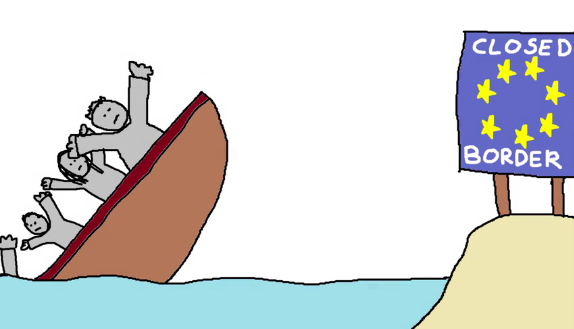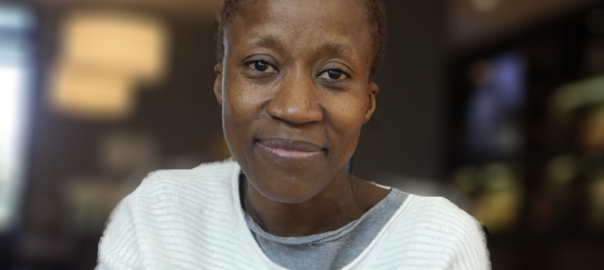In the beginning of March singer-songwriter Rokia Traoré from Mali came to Amsterdam to do an exclusive concert at the North Sea Jazz Club. She was touring round Europe to present her wonderful new album ‘Né So’. At my work at VPRO Vrije Geluiden (Dutch cross media music channel), I am coordinating a group of young people who are thinking about alternative ways to present music and musicians. One of them, the animator Wisse Beets, wanted to do an interview with Rokia without asking her any questions. Instead, he showed her some drawings she could reflect on, with which he made an animation (see below). Her thoughts on a drawing of a half sinking boat full of people were so profound, I decided to transcribe them for News and Noise!
by Charlie Crooijmans
“This is a very sad one. The drama here is not about dreaming for something better, this is very human. The drama lies in the necessity to leave at any cost. Their motive is that they don’t have any hopes or means to make their dreams possible. This is what pushes them to leave. To end that way is not human. It’s difficult to accept this is still possible to happen in the 21st century. Especially when you consider the economic history of the parts of the world where these young people are from, how these parts contributed into making the west economically what it is today. They however were never considered part of it.
I just wrote an article about colonisation, how it was established went on for decades and how it’s connected with the corruption situation now in Africa (There is no link to this article, but here is a link to an article of the UNHCR about Rokia visiting Malian Refugees, CC). As most of these are not refugees but rather migrants from Africa. It’s easy to say Africa’s complicated because of corruption, but corruption didn’t just come out of nowhere. The heritage we have in Africa in terms of public administration and democracy directly came from colonisation. The colonisers probably had not thought of how their ways and methods would impact the colonised when colonisation ends. We have to be careful not to get into the usual blaming of Europe and victimising of Africa, it’s more complicated. What happened decades ago happened. I don’t feel angry at you because your great grandfather was maybe a coloniser decades ago in Mali.

There’s a real problem we as Africans have to face in Africa. To solve it requires understanding what happened, where it came from and to place the responsibilities. Africans migrating to Europe is not a good thing for Africa. Europeans here see it’s not good because there are not enough resources to absorb all these, but I see it’s not good because Africa loses all these people who are supposed to build it. It’s like the slavery time when young people who could have built Africa were forced to leave. In the time of colonisation the resources that could have been used in building Africa were taken out as well. So we can imagine an Africa as a big place where you can go and take any resources you want and share the Africans between other western nations. It’s not complaining about Europe but it’s important to understand what leaders are doing in Africa is directly connected to what colonisers had been doing.
It’s shocking to say that this continent (Africa) is a continent of no one, nation of no one! Everyone wants to leave. People with little who have no perspective are só willing to leave, that they try something that have 80% percentage chance of death! While leaders who can, take everything. They can buy big flats and invest in Europe. A middle class do what they can, but they ‘d leave if they can. So whose continent is Africa ?
We should see how African people still suffer from the negative image of inferiority established by slavery, colonisation, etc. Maybe the solution is to talk about it. I’d like to write a book containing the answers of different Africans – leaders or unknown common people – to just one question: what is Africa for them? I’d like to ask the same question to some Europeans as well. For example, former French president Sarkozy promotes the need of the law to educate at school the positive role French colonisation played in Africa. To dare to talk about a positive role of the European colonisation of Africa shows you don’t know what it meant for the people there. It shows we don’t have the same feeling and understanding of the same question. It was about oppression, about no respect at all. “You do what we say, because we are superior, we are better than you. At the same time we take what we need, and do what we want without asking anyone’s permission”. Colonisation had never been about cooperation or common interest. How can we speak of a positive role of colonisation? We simply don’t feel the same way about the same thing. We need more understanding without the will to push for guilt or anger. We have to talk more about what happened to understand what’s happening now.”
Here you can watch Wisse’s animation of some of the drawings and reflections of Rokia.
